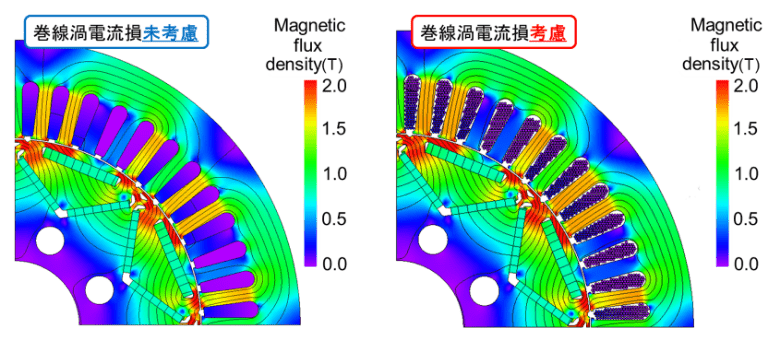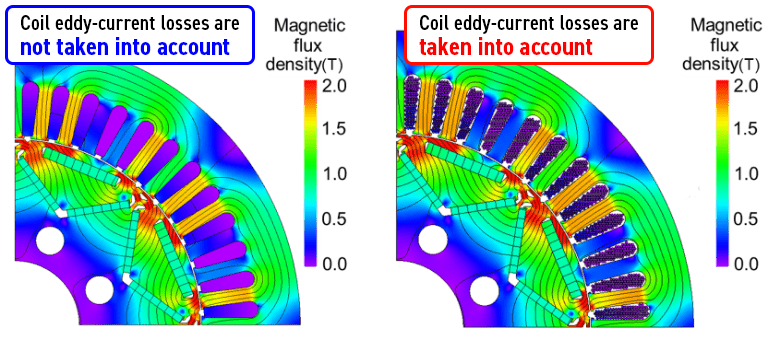TECHNOLOGY

50kW GaNインバータの開発
Development of a 50kW GaN Inverter
GaNパワーデバイスは、低損失性能で高速スイッチングが期待される次世代パワー半導体デバイスです。GaN基板上の縦型GaNパワーデバイスを使ったトラクションインバータを開発しています。縦型GaNデバイスの1チップ当りの電流容量は30A程度であるため、多並列化による大出力化を進めています。
縦型GaNデバイスを4並列配置したGaNパッケージモジュールを開発し、このモジュールを6個使用することで、出力50kWのGaNインバータを実現しています。
GaNデバイスの多並列化やモジュール並列動作しているため、如何にバランスよく動作させるかが、インバータ性能を引き出すための技術課題です。
GaN power devices are next-generation power semiconductor devices expected to be low-loss performance and high-speed switching. We have been developing a traction inverter using vertical GaN power devices on a GaN substrate. As a current capacity per chip for the vertical GaN device is approximately 30A, we are proceeding with high-power output using multiple parallel configurations.
We have developed a GaN package module with four vertical GaN devices in parallel and a 50kW GaN inverter using six of these modules.
Since GaN devices are multi-parallelized and the modules are operated in parallel, the key technical challenge is ensuring balanced operation to maximize inverter performance.
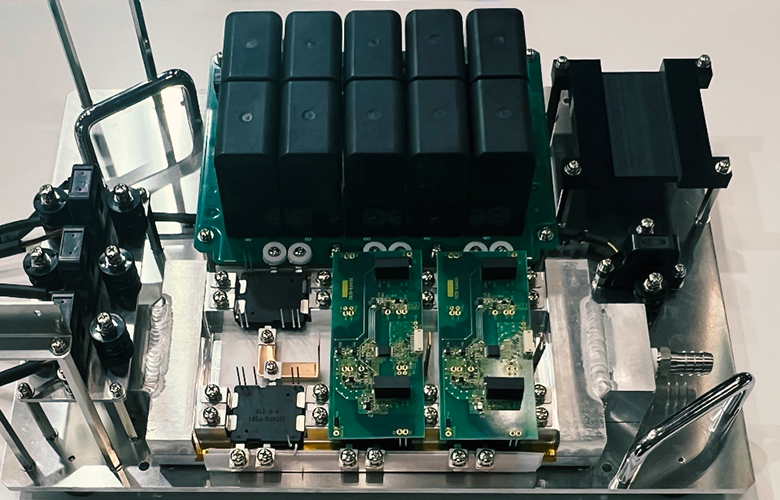
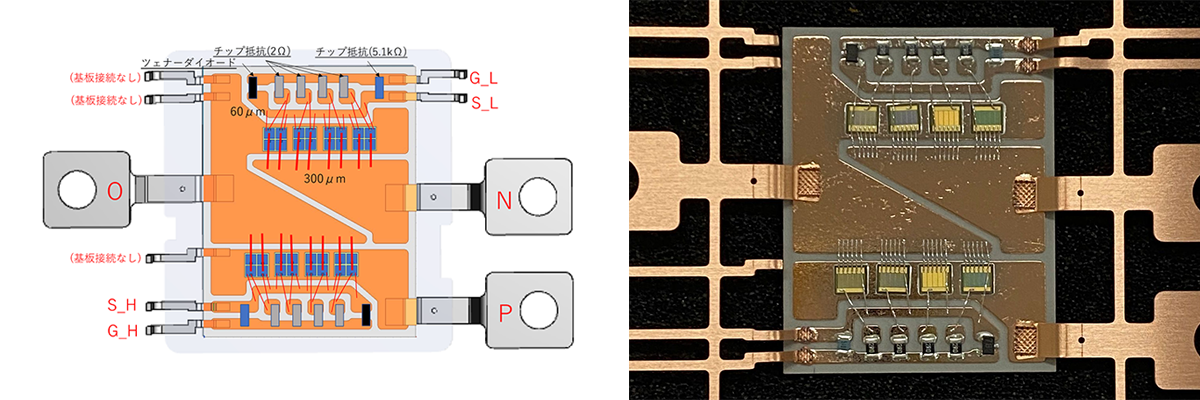
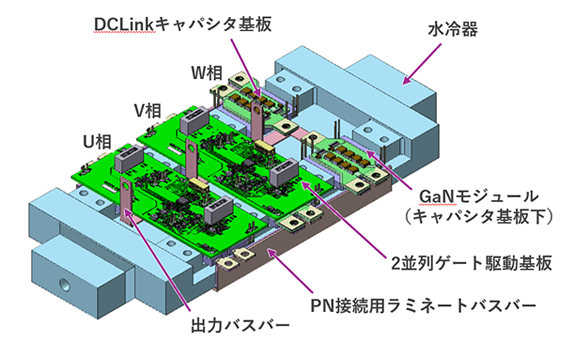
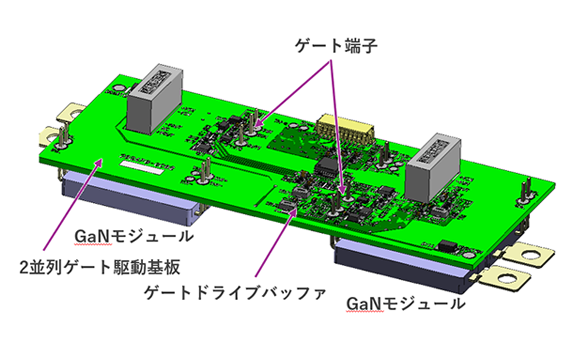
200A GaNモジュールを開発
Developed 200A GaN Module
GaNデバイスの多並列化により大出力GaNパワーモジュールの開発を進めています。縦型GaNデバイスを8並列配置にすることで、縦型GaNデバイスの200Aパワーモジュールを実現しました。
We are developing high-power GaN power modules with the multi-parallelization of GaN devices. By designing eight vertical GaN devices in parallel, we have achieved a 200A power module using vertical GaN devices.
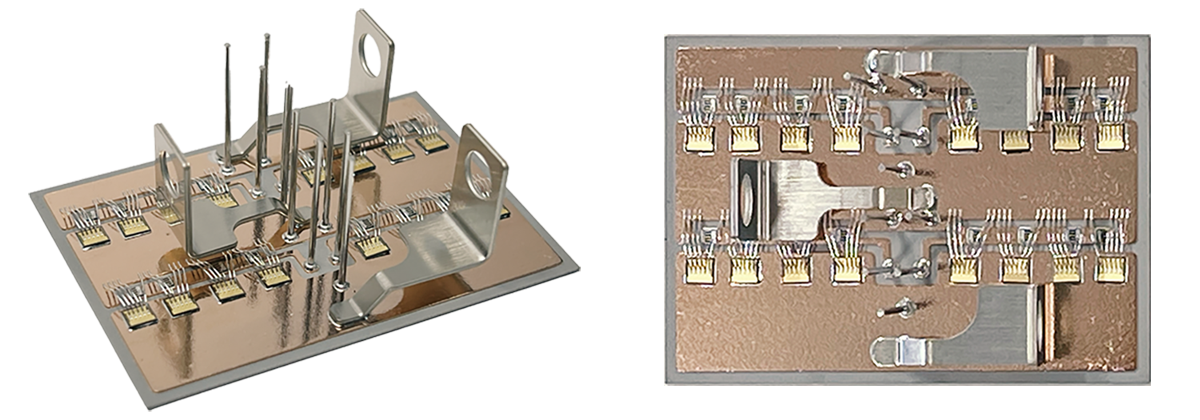
DC Passive Common Noise Canceller (DC-PCC)の開発
Development of DC Passive Common Noise Canceller (DC-PCC)
電圧型PWMインバータはコモンモード電流を発生させ、電動車両のEMIノイズへの対応は課題です。SiCやGaNなどのワイドバンドギャップ半導体を用いたインバータでは車載電子システムへの影響がより顕著となり、EMIノイズへの対策が大きな課題となっています。このノイズの低減のためにコモンモード電圧を受動素子のみでキャンセルするDC受動型ノイズキャンセラーを開発し、PCCによるノイズ低減効果を検証しました。
As voltage-type PWM inverters generate common-mode currents, EMI noise in electric vehicles has been a big issue. Traction inverters using wide bandgap semiconductors such as SiC or GaN have a more pronounced impact on onboard electronic systems, making EMI noise countermeasures a critical challenge. To reduce this noise, we have developed DC-PCC that cancels common-mode voltage using only passive components and verified noise reduction effects achieved.
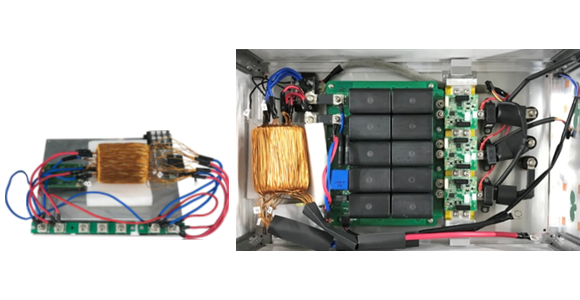
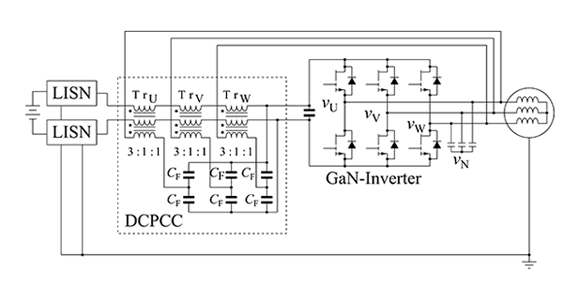
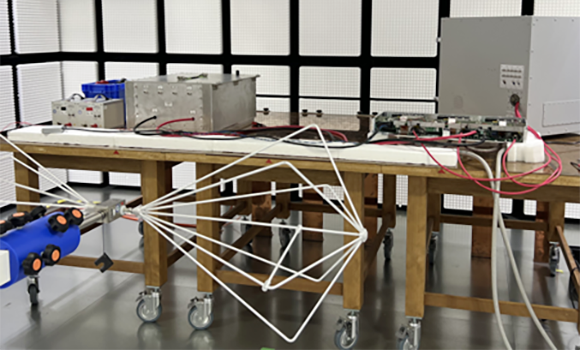
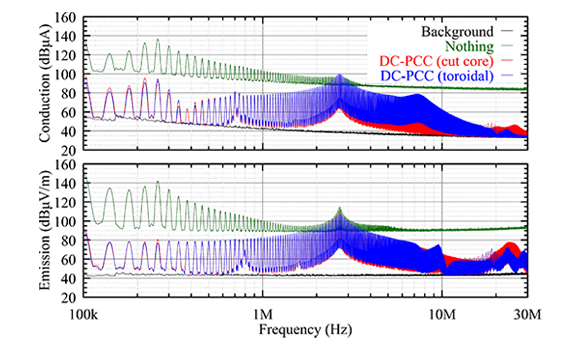

GaNインバータのベンチ評価
Motor bench evaluation using inverter
GaNインバータなどによるモーターの実機評価を実施しています。モーター評価ベンチでは、インバータおよびモーターの入出力特性を実測するほか、インバータの出力電流、スイッチング周波数、デッドタイムなどの制御パラメータを様々に調整し、インバータおよびモーターの効率を評価します。
プロジェクトでは、出力150kWのモーターを評価できるベンチを導入して、インバータの評価を実施しています。
We have been conducting actual motor evaluations using GaN inverter. On the motor evaluation bench, we measure the input/output characteristics of both the inverter and the motor. Furthermore, we adjust various control parameters of the inverter, such as output current, switching frequency, dead time to evaluate efficiencies both the inverter and the motor.
In the project, we have introduced a motor bench capable of evaluating 150kW motors and are conducting inverter evaluations.
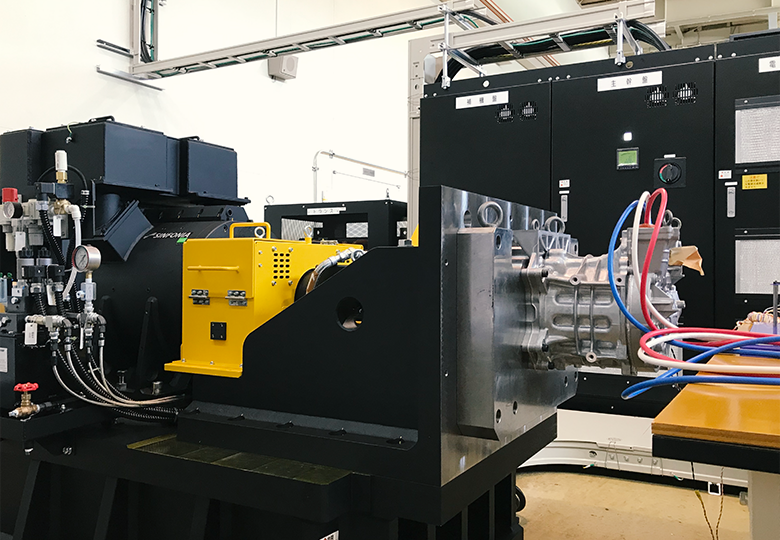
モーター制御研究
Motor Control Research
GaNインバータによるモーターの低損失制御を検討するために、スーパーコンピュータを用いてモーターの電磁界シミュレーションを実施しています。モーターベンチでの測定で実測できるのはモーターの入力特性のみで、モーターで発生するさまざまな損失を個別に評価することができません。そこでモーターを詳細にモデリングした電磁界シミュレーション環境を構築し、インバータの出力電流リプルに対するモーター損失の内訳などの評価を実施しています。GaNインバータにより、モーターの温度上昇の抑制や、損失低減による高出力密度化ができることが判ってきており、EV駆動システムの高効率化、CO2削減効果が期待できます。
Motor losses are broadly classified into iron loss and copper loss. High frequency operation of GaN inverters reduces iron losses, but not copper losses. To optimize motor drive operation with GaN inverters, these motor losses must be evaluated separately. However, since only a mixture of the two losses can be measured on the motor bench, motor electromagnetic simulation must be performed. We have built an electromagnetic simulation environment that models motors in detail and evaluates the breakdown of motor losses against the output current ripple in the inverter. It has been found that GaN inverters can suppress the temperature rise of motors and increase power density by reducing losses. This is expected to increase the efficiency of EV drive systems and reduce CO2 emissions.
